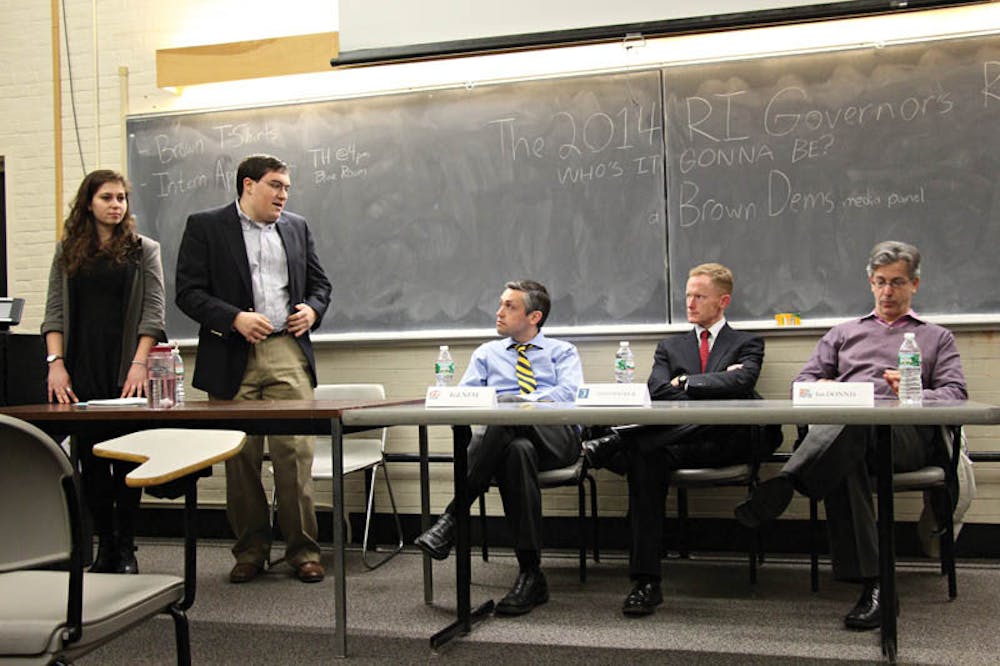The trajectory of the Rhode Island gubernatorial race remains uncertain amid the entrance of new candidates in recent months, said the three members of a panel hosted Tuesday night by the Brown Democrats.
The discussion came nearly two weeks after WPRI released a poll Feb. 12 that showed Mayor Angel Taveras with a four-point lead over General Treasurer Gina Raimondo, The Herald reported at the time.
The panel consisted of WPRI political correspondent Ted Nesi, Rhode Island Public Radio writer Ian Donnis and Ed Fitzpatrick, a Providence Journal columnist. Todd Giroux, a perennial candidate for the governorship, was in attendance as an audience member.
Though the gubernatorial race was the featured topic, Nesi said the Sept. 9 primary is so far away that it is difficult to make accurate predictions at this point.
“It is a pretty wide-open race,” Nesi said, adding that the poll results from earlier this month showed close competition between Taveras and Raimondo. Nesi noted that the four-point difference between the two candidates could be statistically insignificant when accounting for the margin of error. Perhaps more importantly, the poll found that 25 percent of voters were undecided between all gubernatorial candidates, he said.
Democratic candidate Clay Pell’s recent entrance into the campaign was also a subject of the panel’s discussion.
“I think (Pell) does the most damage to Taveras,” Fitzpatrick said, adding that Pell’s personal financial assets and his campaign’s sophisticated digital media strategy are helping him gain popularity. Pell enjoys almost instant name recognition in Rhode Island because of his grandfather, Claiborne Pell, who served as a U.S. senator from Rhode Island from 1961 to 1997, Fitzpatrick said.
The Republican primary race between Cranston Mayor Allan Fung and Ken Block is becoming more interesting, Nesi said. “Ken Block seems to be making waves,” he added, noting that because Republicans are such a small faction in the Ocean State, it is difficult to capture a statistically significant sample, much less to make poll predictions.
The panel’s discussion also focused on Rhode Island’s general political landscape, which the panelists agreed is a relatively small and intimate environment.
“Covering the Rhode Island Democratic Party is like covering the Chinese Communist Party,” Nesi said, describing how being a Democrat in Rhode Island does not necessarily indicate a lot about the candidate’s agenda or position on key issues. “The ‘D’ after the name means very little,” he said. This reality makes it difficult for voters to understand how candidates are aligned on key issues, he added.
“There are like five Democratic Parties in the General Assembly,” Donnis said, adding that it is unlikely the General Assembly will pass any potentially controversial legislation given that it is an election year and members are not interested in isolating voters. Donnis said he thinks that a marijuana legalization bill is “a little too hot to handle right now,” and that it is unlikely any action will be taken on the bill this year.
“If you’re looking for bold proposals, they are likely going to come from the candidates,” Fitzpatrick said.
Nesi agreed, adding that General Assembly legislators “don’t want to do much” as they face upcoming elections.
Democrats control 101 of the 113 General Assembly seats and can therefore easily overcome any veto by a governor of either party, Nesi said. “The General Assembly matters maybe more than any governor,” especially considering that all the candidates would likely experience a similar start to their governorships, he added.
Politics frequently centers on messaging, Donnis said. The 2014 campaign for governor “is becoming a more interesting story than we thought it would be.”

ADVERTISEMENT




